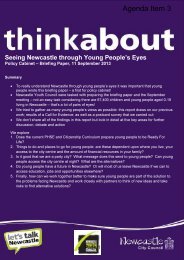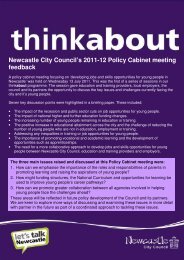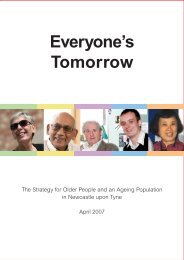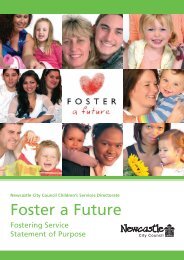NEWCASTLE'S MUSICAL HERITAGE AN INTRODUCTION By ...
NEWCASTLE'S MUSICAL HERITAGE AN INTRODUCTION By ...
NEWCASTLE'S MUSICAL HERITAGE AN INTRODUCTION By ...
Create successful ePaper yourself
Turn your PDF publications into a flip-book with our unique Google optimized e-Paper software.
two music academies listed in the Directory for Newcastle and Gateshead. Until<br />
1778 there were no directories in Newcastle, the first was drawn up and<br />
published by William Whitehead, musical instrument maker and turner of High<br />
Bridge. He went on to publish a number of further directories until his death in<br />
December 1792. Another aspect of musical life that was to take hold in the<br />
second half of the 18 th century in Newcastle and flourish in the following century<br />
was the theatre. The first Theatre Royal opened its doors on Mosley Street in<br />
1788 and until 1836 presented between straight drama, comic opera and other<br />
musical events. The story of Newcastle’s theatres and their music is both<br />
interesting and amusing and I shall return to them in a later chapter.<br />
There were many other musical activities taking place in the town involving<br />
people from all social classes. People who did not give a fig for Mr Avison’s art<br />
music but found melodious strains necessary as an accompaniment to their<br />
entertainments. Formal balls and dance evenings were held in the Old Assembly<br />
Rooms, which stood on the opposite side of the street to the present building,<br />
until 1736 when the New Assembly Rooms in the Groat Market were erected.<br />
Forty years later, In 1776, the present Assembly Rooms in Fenkle Street were<br />
built, and they in turn saw many happy hours glide away to the magic sound of<br />
gay dance music ‘in the good old time when George II was king. Periwigs,<br />
powder and patches, full skirted coats, ample hoops and silver buckles’. There<br />
would also have been select gatherings of gentlemen in their exclusive clubs or<br />
homes as well as half starved and unwashed bodies from the lower classes in<br />
bawdy taverns and quayside haunts singing amongst other things popular rounds<br />
and catches. The catch was a type of comic round for male voices, which had<br />
been popular in England from the late 16 th century. All social classes of men<br />
sang them. How and where the catch came from is not entirely clear but it is<br />
thought to have started as an amusement for the moneyed and privileged and<br />
then spread to the lower social groups. The words were often obscene and<br />
usually on such subjects as drink, tobacco and sex. One cannot imagine Charles<br />
Avison turning his hand to catches but Henry Purcell was not above doing so<br />
when he wrote “Once, twice, I Julia try’d / The scornful puss as oft deny’d”. When<br />
William Jackson, organist of Exeter Cathedral in the 1790s stated that catches<br />
were three parts obscenity to one part music, Purcell’s verse was cleaned up to<br />
read “One, two, three our numbers right / To sing our song tonight”.<br />
Also sung in 18 th century Newcastle, but more acceptable in general music<br />
circles, would have been the glee. The main inspiration behind the 18 th century<br />
glee was the English madrigal of 1590 – 1630 and to a generation whose<br />
experience of partsong was largely limited to obscene catches, the flowing lines,<br />
sensuous textures and poetic seriousness of the Elizabethan and Jacobean<br />
madrigal came as a revelation and a challenge. Again, as with the catch the glee<br />
started in the upper social classes and grew in popularity until by the 19 th century<br />
it had even spread to the lower social groups when an increase in the popularity<br />
of choral singing brought together the different social classes with the common<br />
aim of making music. The vocal groupings in glees called upon women to sing<br />
25

















